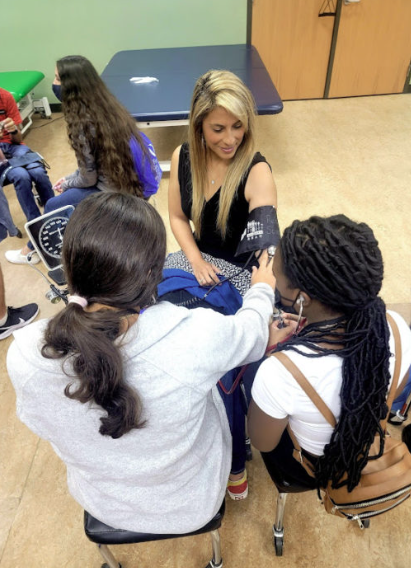Embarking on a career in healthcare is a noble and rewarding journey, offering opportunities to make a real difference in people’s lives. For high school students, the path to a medical career may seem distant, but with the right preparation, you can take crucial steps now to lay a strong foundation for the future. Whether you aspire to become a doctor, nurse, physical therapist, or medical technician, high school is an excellent time to start preparing for success in the healthcare field.
One of the first steps in preparing for a medical career is to focus on academics. A strong foundation in science and math is critical, as these subjects are the building blocks for advanced medical studies. High school biology, chemistry, physics, and algebra are essential courses that you’ll encounter again in college and medical school. Mastering these subjects will give you a head start in understanding complex medical concepts and prepare you for the rigorous coursework ahead. Although these subjects may seem challenging at times, remember that consistency and dedication are key. Your goal should be to grasp the concepts as thoroughly as possible, so don’t hesitate to ask for help if you need it. Your teachers, tutors, and online resources are great assets when tackling difficult material.
In addition to your core subjects, taking part in extracurricular activities related to healthcare can be extremely beneficial. Many high schools offer clubs and programs like HOSA (Health Occupations Students of America) or science clubs, which focus on health-related topics. These clubs often offer competitions, workshops, and leadership training that can enhance your knowledge of healthcare professions. They also provide an opportunity to network with like-minded students and professionals who share your passion for medicine.
One of the most impactful ways to gain real-world experience in the healthcare field is by volunteering. Hospitals, clinics, nursing homes, and even local health organizations often welcome volunteers. While you may not be performing medical procedures initially, volunteering gives you a valuable opportunity to observe healthcare professionals at work and understand the daily responsibilities of those in medical careers. Even simple tasks like assisting with patient intake, organizing supplies, or providing administrative support can give you valuable insight into the healthcare environment. Moreover, volunteering demonstrates your commitment to a career in healthcare and shows prospective colleges and employers that you are serious about your future.
As you prepare for your medical career, it’s important to explore the wide range of career options within the healthcare field. While many students automatically think of becoming a doctor, there are numerous other rewarding healthcare careers to consider. Nurses, physical therapists, radiologic technologists, medical laboratory scientists, and respiratory therapists all play crucial roles in patient care. Each of these professions has its own set of responsibilities and opportunities for growth. Taking the time to explore different healthcare careers will help you identify which one aligns best with your interests and strengths. Shadowing a healthcare professional or interviewing someone already working in the field is a great way to gain a deeper understanding of the day-to-day responsibilities of various roles.
Another key area of preparation is college readiness. A medical career often requires extensive post-secondary education, so it’s essential to begin preparing for the demands of college coursework now. If your school offers Advanced Placement (AP) or dual enrollment courses, consider enrolling in them. These programs allow you to earn college credits while still in high school, which can ease your academic workload later and demonstrate to colleges that you are capable of handling challenging coursework. AP courses in biology, chemistry, or psychology will give you a head start in these subjects, while dual enrollment can give you a taste of what college-level classes are like.
In addition to academics, developing strong communication skills is crucial for success in the medical field. Healthcare professionals must be able to communicate clearly with patients, families, and other members of the medical team. Whether you’re explaining complex medical information to a patient or collaborating with colleagues, being able to express yourself confidently and empathetically is essential. Participating in activities like debate, public speaking, or drama can help you build these communication skills. These experiences will not only make you a better healthcare professional but also prepare you for interacting with people from various backgrounds and cultures, which is essential in a diverse healthcare setting.
Time management and organization are also key skills to develop in high school. The ability to juggle academic responsibilities, extracurricular activities, and personal commitments is essential in healthcare careers, where professionals often work long hours and handle multiple tasks simultaneously. Learning to prioritize your time and stay organized will benefit you both in high school and throughout your career. Consider using planners or digital apps to help you stay on top of assignments, deadlines, and appointments. Developing these habits now will make it easier to handle the demanding schedule that comes with medical school and a healthcare career.
Building a network of mentors and healthcare professionals is another valuable step in preparing for a medical career. Consider reaching out to local healthcare providers to ask about shadowing opportunities or mentorship programs. Having a mentor in the field can provide you with valuable advice, career guidance, and personal insight into the realities of working in healthcare. Your high school guidance counselor may also be able to help connect you with resources or professionals who can offer advice and support as you navigate your career path.
Finally, stay curious and motivated about healthcare. Read books, watch documentaries, and listen to podcasts related to the medical field. Keep up with new trends, innovations, and discoveries in medicine. The more you immerse yourself in healthcare topics, the more you’ll find your passion and understanding of the field grow. Staying curious will keep you motivated, even when challenges arise, and will help you maintain a lifelong commitment to learning, which is essential in the ever-evolving field of healthcare.
In conclusion, preparing for a medical career in high school is not only possible but can set you on a path to success. By focusing on academics, gaining real-world experience, exploring different healthcare careers, and building strong study habits and communication skills, you can start building a solid foundation for your future in medicine. Whether you dream of becoming a doctor, nurse, or allied health professional, the steps you take today will help you succeed tomorrow. With dedication, passion, and preparation, you can turn your dream of working in healthcare into a reality.














